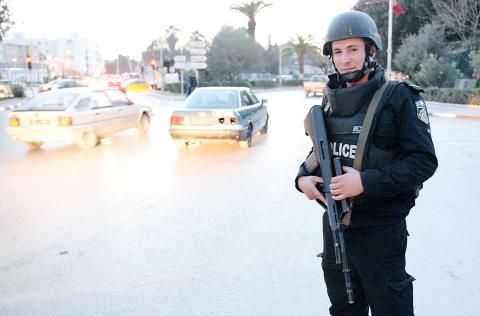Tunisian Prime Minister Habib Essid on Monday fired six police commanders, including the head of tourist security, after a militant attack at the National Bardo Museum on Wednesday last week in which 20 foreign visitors were killed.
Essid’s spokesman Mofdi Mssedi said the six also included an intelligence brigade chief, the Tunis district police chief, the traffic police commander, a Bardo Museum security chief and a commander for the capital’s Sidi Bachir District.
“Prime Minister Habib Essid visited the Bardo Museum yesterday [Sunday] and took note of several security failures there,” Mssedi said.

Photo: AFP
Militant gunmen killed 20 foreign tourists, including Japanese, Polish, Italian and Spanish visitors, as they got off buses at the Bardo Museum, inside the parliament compound that is normally heavily guarded.
It was the worst attack in more than a decade in Tunisia, testing the North African nation’s young democracy four years after the revolt that overthrew autocrat Zine El Abidine Ben Ali and opened the way for free elections.
One police officer working at the museum was arrested for abandoning his post during the attack, local radio and media reported. Officials did not immediately confirm the arrest.
Japanese Parliamentary Vice Minister of Foreign Affairs Kazuyuki Nakane visited Tunisia on Monday to discuss the case with Tunisian Minister of Foreign Affairs Taieb Baccouche.
“We gave our condolences for the families of the Japanese victims,” Baccouche told reporters outside the Japanese embassy in Tunis.
Foreign dignitaries have been invited to Tunis on Sunday to participate in a march against terrorism in the same way that France brought world leaders to Paris after the attacks on the French satirical magazine Charlie Hebdo in January.
Another demonstration was due to take place in Tunis yesterday when the Bardo Museum was scheduled to reopen.
Two gunmen were shot dead at the scene in Tunis and authorities say they are looking for a third suspect. They have so far arrested more than 20 people, 10 of whom officials believe were directly involved in the attack. Some had recently returned from fighting for Islamis militant groups in Syria, Iraq and Libya.
Militants belonging to the Islamic State group, formerly known as the Islamic State of Iraq and the Levant, fighting in Iraq and Syria claimed that their supporters carried out the attack although a local al-Qaeda affiliated group known as Okba Ibn Nafaa has also published details and comments on the assault.
Tunisia has been largely spared the violent aftermath of the Arab Spring uprisings of 2011, with secular and Islamic parties overcoming their divisions to compromise, approve a new constitution and hold free elections.
Hardline Islamic groups also emerged after the revolt against Ben Ali swept away his one-party rule. Since then security forces have been caught up in a growing battle with militants, some of whom are returning from training and fighting overseas.
Authorities said that the two gunmen killed in the Bardo attack had trained in jihadi camps in Libya after they were radicalized in local mosques by militant recruiters. More than 3,000 Tunisians left to fight in Syria and Iraq, and hundreds have returned, creating a security risk for authorities.

BACKLASH: The National Party quit its decades-long partnership with the Liberal Party after their election loss to center-left Labor, which won a historic third term Australia’s National Party has split from its conservative coalition partner of more than 60 years, the Liberal Party, citing policy differences over renewable energy and after a resounding loss at a national election this month. “Its time to have a break,” Nationals leader David Littleproud told reporters yesterday. The split shows the pressure on Australia’s conservative parties after Prime Minister Anthony Albanese’s center-left Labor party won a historic second term in the May 3 election, powered by a voter backlash against US President Donald Trump’s policies. Under the long-standing partnership in state and federal politics, the Liberal and National coalition had shared power

CONTROVERSY: During the performance of Israel’s entrant Yuval Raphael’s song ‘New Day Will Rise,’ loud whistles were heard and two people tried to get on stage Austria’s JJ yesterday won the Eurovision Song Contest, with his operatic song Wasted Love triumphing at the world’s biggest live music television event. After votes from national juries around Europe and viewers from across the continent and beyond, JJ gave Austria its first victory since bearded drag performer Conchita Wurst’s 2014 triumph. After the nail-biting drama as the votes were revealed running into yesterday morning, Austria finished with 436 points, ahead of Israel — whose participation drew protests — on 357 and Estonia on 356. “Thank you to you, Europe, for making my dreams come true,” 24-year-old countertenor JJ, whose

A documentary whose main subject, 25-year-old photojournalist Fatima Hassouna, was killed in an Israeli airstrike in Gaza weeks before it premiered at Cannes stunned viewers into silence at the festival on Thursday. As the cinema lights came back on, filmmaker Sepideh Farsi held up an image of the young Palestinian woman killed with younger siblings on April 16, and encouraged the audience to stand up and clap to pay tribute. “To kill a child, to kill a photographer is unacceptable,” Farsi said. “There are still children to save. It must be done fast,” the exiled Iranian filmmaker added. With Israel

Africa has established the continent’s first space agency to boost Earth observation and data sharing at a time when a more hostile global context is limiting the availability of climate and weather information. The African Space Agency opened its doors last month under the umbrella of the African Union and is headquartered in Cairo. The new organization, which is still being set up and hiring people in key positions, is to coordinate existing national space programs. It aims to improve the continent’s space infrastructure by launching satellites, setting up weather stations and making sure data can be shared across